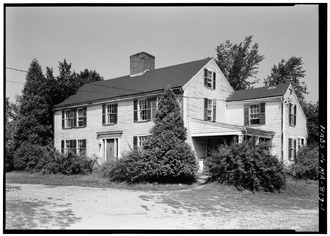Samuel Brooks House (Massachusetts) facts for kids
Quick facts for kids Samuel Brooks House |
|
|---|---|

The house in the mid-20th century
|
|
| General information | |
| Architectural style | Colonial, Georgian |
| Location | Concord, Massachusetts, U.S. |
| Address | 1175 Lexington Rd |
| Coordinates | 42°27′12″N 71°18′32″W / 42.45339°N 71.30886°W |
| Completed | 1692 (NPS) 1733 (MACRIS) |
| Technical details | |
| Floor count | 4 (including the cellar) |
The Samuel Brooks House is an important historical building in Concord, Massachusetts, USA. It played a part in the American Revolutionary War. Today, it's part of the Minute Man National Historical Park, a place that remembers the start of the war. You can find it on North Great Road, very close to Battle Road, which was once called Bay Road.
The house is near the town of Lincoln. This area was owned by the Brooks family since the mid-1600s. During the time of the Revolution, this spot was known as Brooks Hill. A group of houses there was called Brooks Village. Three other Brooks family homes are nearby: the Job Brooks House, the Noah Brooks Tavern, and the Joshua Brooks House.
Samuel Brooks inherited this house from his father, who was also named Samuel. The National Park Service bought the property in 1963 to preserve its history.
The Start of the American Revolution
What Happened at Lexington and Concord?
The famous battles of Lexington and Concord began early on April 19, 1775. British soldiers marched past the Samuel Brooks House on their way to Concord. They also passed it again when they were returning to Boston.
Paul Revere's Famous Ride
On the night of April 18, 1775, Paul Revere and William Dawes were riding to Concord. They were trying to warn people that British soldiers were coming. A British Army patrol stopped them nearby.
Another rider, Samuel Prescott, was with them. Prescott was able to escape by jumping his horse over a wall and into the woods. He then rode to the Hartwell Tavern. There, he woke up Ephraim Hartwell and told him about the British soldiers.
Ephraim sent his enslaved person, Violet, to warn his son and his family. Mary Hartwell then shared the message with Captain William Smith. Captain Smith was in charge of the Lincoln minutemen. His home, the Captain William Smith House, is still standing along Battle Road. Thanks to these warnings, the minutemen got the message in time. They arrived at Old North Bridge before the British soldiers. Samuel Prescott also made it all the way to Concord to spread the alarm.
 | William L. Dawson |
 | W. E. B. Du Bois |
 | Harry Belafonte |

